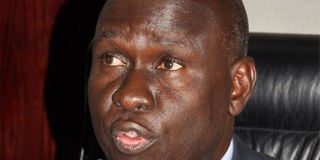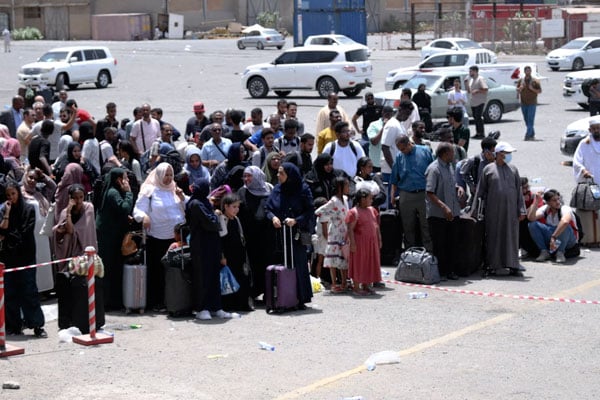Worst and best MPs exposed

Best: Wafula Oguttu (Bukooli Central)
What you need to know:
Criteria. The rating was based on the lawmakers individual contributions on the floor of Parliament while core legislative agenda and performance in plenary sessions was used for their grading.
Parliament. More than half of the 386 MPs in the 9th Parliament have not efficiently represented their electorate or made a meaningful contribution on the floor of Parliament.
An investigation by Daily Monitor has revealed that of the 200 MPs with questionable performance, nearly 50 of them - the worst performers; either sat in Parliament for six months without saying anything; or continuously missed House sittings (without the Speaker’s written permission or whatever they said didn’t add value to the debate.
In defence, the MPs who talked to Daily Monitor at the weekend, said they had been sick, some insisted they speak in committees and didn’t believe that they did not contribute anything substantial on the floor.
Some NRM lawmakers said once the party Caucus resolves on any matter, party discipline dictates they respect the party position.
In order to track the performance of MPs for accountability purposes, Daily Monitor examined all the 60 copies of the Hansard– the official record of Parliament, covering 60 sittings held in the Fourth Session of Parliament (June 2014- December 2014).
The first meeting (June- October) had 30 sittings and the second meeting (November- December) had 22 sittings.
The rating of each of the 386 MPs was based on their individual contributions on the floor of Parliament. The Speaker and Deputy were not rated.
The grading was based on the core legislative agenda and the performance of MPs in plenary sessions the committee of the House where members’ representative roles are tested.
Some of the worst performers are Mr Kaddu Mukasa Ssozi (Mityana North), Mr Sam Engola (Erute South), Mr Moses Balyeku (Jinja West), Mr Stephen Dede (Bukooli South), Ms Susan Amero (Amuria Woman), Mr Fredrick Nkayi (Kagoma), Mr Chris Charles Angina (UPDF), Mr David Wakikona (Manjiya).
On why some MPs are active in committees and silent in plenary, Mr Morris Rwakakamba, the chief executive officer for Agency for Transformation, a local think-tank, said under a multiparty system, most issues are resolved in committees and caucuses.
However, he added: “Some MPs don’t research and therefore lack the necessary confidence to deliver in plenary.”
Best performers
It was not all about gloom, though since there are some MPs who dominated the floor.
They include, Mr Robert Kasule Ssebunya (Kyadondo North) who contributed 287 times in the period under review, Mr Nathan Nandala Mafabi (Budadiri West) and Geoffrey Ekanya (Tororo) tied in the second position with 286 times and Junior Finance minister Fred Omach (Jonam) came third with 265 followed by Atim Cecilia Ogwal (82), Mr Medard Ssegona (Busiro East) (80, Mr Phillip Wafula Oguttu (Bukooli Central) (74).
For the rest of the members, including ministers, their performance was based on core legislative benchmarks such as Prime Minister’s question time, questions for oral answers, Bills committee stage, debates on committee reports on, Bills, policy statements, motions, petitions and resolutions, among others.
Senior legislators who talked to Daily Monitor about what many called a “complex matter” believe the problem in Parliament is lack of capacity of some MPs “to engage and remain relevant to issues at hand”.
Mr Benjamin Cadet (Bunyaruguru), however, blamed voters who prefer cash handouts to MPs’ contributions in Parliament.
“Politics is commercialised, voters want money to help them solve personal problems such as burial, school fees and medical costs. That is why some MPs are elected not because they are articulate and can speak in Parliament but because of such charity work,” Mr Cadet said.
Mr Mathias Mpuuga (Masaka Municipality) said: “The nature of our polity can only offer that yield. Voters have no chance choosing the best, but rather who can cook pilao for them and some MPs are even gagged.”
“It’s a tragedy that some even simply come to the House to sign the attendance book and then disappear. Those who remain in the House are not free to express the views of their people because they fear to annoy the President.”
Advice
Mr Mpuuga advised some members to either stay away whenever there is a controversial matter on the floor or attend the House proceedings and keep quite to remain in the good books of their party chairperson.
Mr Crispy Kaheru, the coordinator of the Citizens’ Coalition for Electoral Democracy in Uganda, considered a range of factors affecting performance.
He said MPs elected may not be conversant with most of the issues debated in Parliament, the nature of issues debated may not enlist so much interest of those non-participating parliamentarians and it could be illustrative of the fact that there is a weak linkage between the MPs and their electorate.
LEGISLATORS’ TAKE ON RANKING
Mr Moses Balyeku, the Jinja Municipality West MP, said he was one of the most active lawmakers. “Bills, which are later tabled and debated on the floor, come from the committees. I contribute in the committees,” Mr Balyeku said.
Mr Kaddu Mukasa Ssozi (Mityana South) and Mr Joseph Mutebi Balikudembe (Busiiro South) said they were ill during the assessed period. The former was involved in an accident whereas the latter underwent an operation, which he is still recuperating from.
Ms Barbara Nekesa Oundo (Busia District Woman Representative) said: “Those things [of tracking the performance of MPs on the floor of Parliament] are unrealistic and hopeless”.
Ms Agnes Nabirye (Jinja Woman) said legislators’ contribution on the floor of Parliament is partly a function of the topics being discussed, adding that: “We contribute during the committee sessions.”
Ms Juliana Auma (Abim Woman MP) and Mr Nulu Byamukama (Kitagwenda MP) said once the Movement caucus agrees on something, many of its members thereafter leave it to the officials to speak on their behalf.
“So, unless you want to be like Theodore Ssekikubo [Lwemiyaga MP] and want to capture the attention of the media, you might not debate,” Ms Byamukama said.
Change criteria
Ms Auma said she had been contributing in the committee sittings while Mr Byamukama said it is high time voting is reflected as an indicator for people to get the big picture of the legislators’ contributions.
Ms Christine Amongin Aporu (Kumi Woman), the Minister of State for Teso Affairs, said Cabinet ministers speak through the Leader of Government Business in Parliament, the Prime Minister.
She said given the size of the House, 386 members, not everybody could speak. She claimed that simply attending parliamentary sessions “is a form of representation”.
Mr Sam Engola (Erute South) said he had not been very active in Parliament because he is usually abroad on official duty. Me Engola said since the Lands ministry has four ministers, they agreed that at any one time, one should represent the team in Parliament so that the other could attend to matters that require them to be in office.
Mr Issa Kikungwe (Kyadondo South), Mr Frederick Mbagadhi (Kagoma), Mr David Wakikona (Manjiya) and Ms Robinah Nabbanja (Kibaale Woman) neither answered the calls nor replied the text message Daily Monitor sent to them.
Mr Ignatius Besisira (Buyaga East) said he was ‘attending a function’, and therefore, could not comment. Mr Ronald Kibuule (Mukono North), Mr Khiddu Makubuya (Katikamu South), Mr Manoah Achile Mila (Aringa) and Ms Susan Amero (Amuria Woman), among others, could not be reached on phone for comment.
Excluded
Although Speaker Rebecca Kadaga (NRM, Kamuli Woman) and her deputy Jacob Oulanyah (NRM, Omoro) have constituencies, they were not evaluated because they preside over the proceedings of the House. Ms Lucy Akello (Amuru) was not ranked because she joined the House in December.




